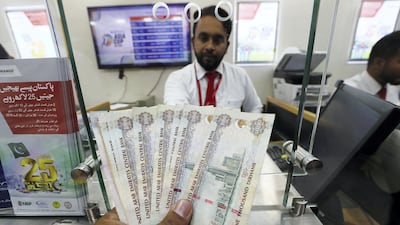The Central Bank of the UAE and other Arabian Gulf regulators raised their benchmark interest rates following the fourth rate increase this year by the US Federal Reserve, which on Wednesday trimmed the outlook for further hikes in 2019.
The UAE's banking regulator increased the interest rate by 25 basis points on its certificate of deposits, the monetary policy instrument through which changes in interest rates are transmitted to financial institutions.
The rate rise is effective from Thursday, which is also when the repo rate on borrowing short-term liquidity from the central bank against certificates of deposits goes up by 25 bps.
The Fed on Wednesday lifted the federal funds rate target to a range of 2.25 per cent to 2.5 per cent. This is the ninth increase since 2015 when it started gradually increasing the cost of borrowing. The move comes on the back of continued strength of the US economy as inflation remains below its 2 per cent target rate.
Most Gulf central banks mimic the Fed's moves due to the peg of their currencies to the US dollar. Kuwait is the only Gulf country to link its dinar to a basket of currencies.
Saudi Arabia's central bank said it was raising its repo rate by 25 bps to 3 per cent, and its reverse repo rate by the same margin to 2.5 per cent. Bahrain's banking regulator raised interest rate on its one-week deposit facility to 2.75 per cent from 2.5 per cent. It also increased the overnight deposit rate by 25 bps to 2.5 per cent, and the lending rate to 4.5 per cent.
Kuwait said it is keeping its key discount rate unchanged at 3 per cent.
Central banks in the Gulf states don’t always raise or cut rates on each specific occasion when the Fed does, but they broadly follow it over the long run.
Although the Fed increased rates as expected, it trimmed the number of increases it foresees in 2019 to two from three, a sign it may soon pause monetary tightening.
“There’s significant uncertainty about - both the path and the ultimate destination of any further rate increases,” said Fed chairman Jerome Powell.
The tone of the Fed meeting was “expected to turn dovish, consistent with recent communication from Federal Open Market Committee members”, Monica Malik, the head of research at Abu Dhabi Commercial Bank, said in a research note.
After the two 2019 hikes, Ms Malik sees “the rate-hiking cycle likely coming to an end”.
__________
Read more:
UAE Central Bank follows Fed and raises key interest rate by 25 basis points
Most GCC Central banks likely to mimic Fed as it prepares to raise interest rates
Fed lifts rates, steepens path through 2020 for more hikes
UAE Central Bank raises interest rates by 25 basis points
__________
Richard Jerram, chief economist at Bank of Singapore said the Fed chairman “gave a reminder to financial markets that even though policy has been tightening, it is still relatively loose”.
“This is not a policy environment where we would expect a serious economic slowdown. Interest rates remain below neutral levels and supportive of growth,” he said.
The quarter point rate hike came despite US President Donald Trump criticising the Fed on Twitter ahead of its decision to raise the cost of borrowing.
Mr Powell, however, said political considerations play no role in Fed policy making.
“We’re going to do our jobs the way we’ve always done them,” he was quoted as saying by Bloomberg when asked about White House pressure. The Fed will do its analysis and “nothing will cause us to deviate from that,” he added.
The Fed has been increasing rates, ignoring the US-China trade tensions that are threating to derail the global economic growth. The meeting between US President Donald Trump and his Chinese counterpart Xi Jinping during the G20 summit has resulted in a pause to further trade hostilities between the world’s two largest economies until the end of this year.
The Fed has acknowledged the threats from a softening global economic growth.
The Fed “will continue to monitor global economic and financial developments and assess their implications for the [US] economic outlook,” it said in a statement.


